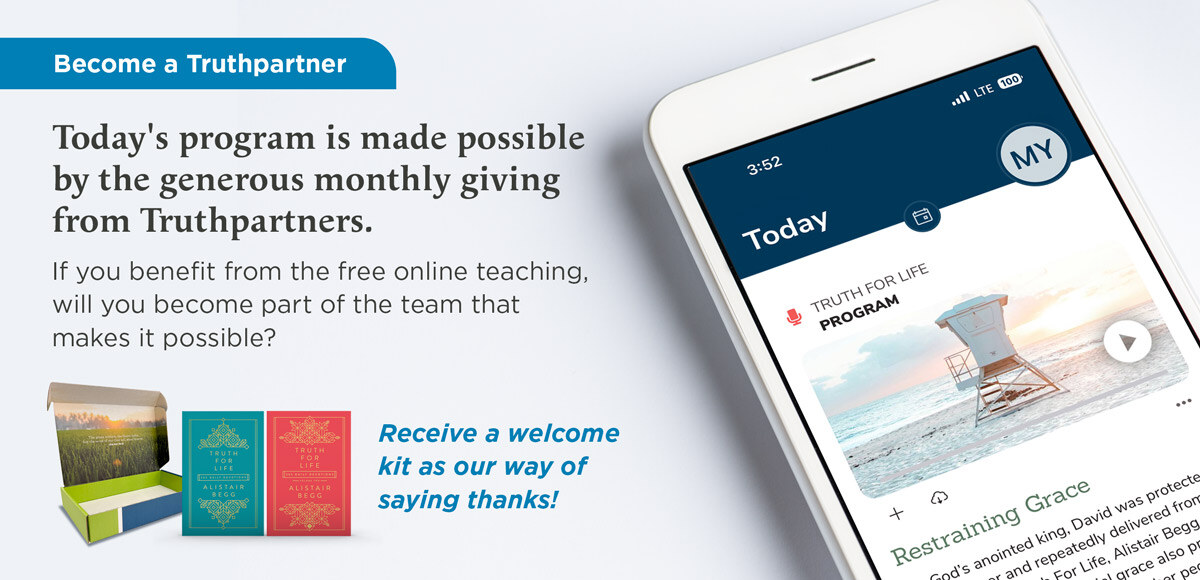
A Theology of Grief
When Naomi returned to Bethlehem, leaving the graves of her husband and sons behind in Moab, we can only imagine the pain and grief she experienced as she came back to familiar places and faces. What thoughts and memories would have emerged? Oh, that’s Mrs. So-and-So, and those must be her sons. Look how they’ve grown! This is where I used to bring the boys. This is where Elimelech and I used to walk…
As bitterness over her situation set in, Naomi, whose name means “pleasant,” decided that a more suitable name for herself was Mara, which means “bitter.” She didn’t attempt to sweep life’s challenges aside and convince everyone that everything was fine. To do so would have been less than honest—a betrayal of the theology underpinning her faith amid what the hymn writer William Cowper called “a frowning providence.”[1]
Naomi’s situation speaks to the fact that even for God’s people, some pain in life will seem unbearable, some circumstances will appear unjust, and some questions will remain unanswered. Her response raises a question: what will we do when grief strikes in our own lives? The reality of suffering is a problem for the Christian, but it is no less a problem for everyone else. All people must wrestle with the problem of pain. An atheist can’t do so satisfactorily, because if there is no God, we simply live in a universe of chance, where things just tumble along. But the Christian can ask—indeed, we should ask—“Where is God in the midst of this?”
Naomi’s honest expression of emotion is matched by her theology. She doesn’t attribute all that has happened to chance, but she acknowledges God’s hand at work. She declares that God is right in the midst of her pain; she calls Him Shaddai, “Almighty,” the providing, protecting God. What does Shaddai mean? It’s the characteristic of God that means He’s at His best when we are at our worst.[2] Naomi had gone through famine, loss, bereavement, doubts, and goodbyes—but because she knew God as Shaddai, she could leave the explanation and the responsibility for such bitter trials with Him.
Where do you turn when the waves hit, when the wheels run off the road, when everything goes haywire? It must be to your knowledge of who God is and how He deals with His people. This is a sure foundation on which to stand. Where else can we go?
When Naomi left Bethlehem, there was famine. When she returned, there was harvest. Through the clouds of grief, the light of hope began to break as the stage was set for God to provide abundantly for Naomi and Ruth. When God is at work, even hopelessness may be the doorway to fresh starts and new opportunities. He will one day dispel all darkness. God is your Shaddai. In which part of your life do you need to hear this today? And who around you needs you to share this with them?
How is God calling me to think differently?
How is God reordering my heart’s affections — what I love?
What is God calling me to do as I go about my day today?
Naomi Widowed
1In the days when the judges ruled there was a famine in the land, and a man of Bethlehem in Judah went to sojourn in the country of Moab, he and his wife and his two sons. 2The name of the man was Elimelech and the name of his wife Naomi, and the names of his two sons were Mahlon and Chilion. They were Ephrathites from Bethlehem in Judah. They went into the country of Moab and remained there. 3But Elimelech, the husband of Naomi, died, and she was left with her two sons. 4These took Moabite wives; the name of the one was Orpah and the name of the other Ruth. They lived there about ten years, 5and both Mahlon and Chilion died, so that the woman was left without her two sons and her husband.
Ruth's Loyalty to Naomi
6Then she arose with her daughters-in-law to return from the country of Moab, for she had heard in the fields of Moab that the Lord had visited his people and given them food. 7So she set out from the place where she was with her two daughters-in-law, and they went on the way to return to the land of Judah. 8But Naomi said to her two daughters-in-law, “Go, return each of you to her mother's house. May the Lord deal kindly with you, as you have dealt with the dead and with me. 9The Lord grant that you may find rest, each of you in the house of her husband!” Then she kissed them, and they lifted up their voices and wept. 10And they said to her, “No, we will return with you to your people.” 11But Naomi said, “Turn back, my daughters; why will you go with me? Have I yet sons in my womb that they may become your husbands? 12Turn back, my daughters; go your way, for I am too old to have a husband. If I should say I have hope, even if I should have a husband this night and should bear sons, 13would you therefore wait till they were grown? Would you therefore refrain from marrying? No, my daughters, for it is exceedingly bitter to me for your sake that the hand of the Lord has gone out against me.” 14Then they lifted up their voices and wept again. And Orpah kissed her mother-in-law, but Ruth clung to her.
15And she said, “See, your sister-in-law has gone back to her people and to her gods; return after your sister-in-law.” 16But Ruth said, “Do not urge me to leave you or to return from following you. For where you go I will go, and where you lodge I will lodge. Your people shall be my people, and your God my God. 17Where you die I will die, and there will I be buried. May the Lord do so to me and more also if anything but death parts me from you.” 18And when Naomi saw that she was determined to go with her, she said no more.
Naomi and Ruth Return
19So the two of them went on until they came to Bethlehem. And when they came to Bethlehem, the whole town was stirred because of them. And the women said, “Is this Naomi?” 20She said to them, “Do not call me Naomi;1 call me Mara,2 for the Almighty has dealt very bitterly with me. 21I went away full, and the Lord has brought me back empty. Why call me Naomi, when the Lord has testified against me and the Almighty has brought calamity upon me?”
22So Naomi returned, and Ruth the Moabite her daughter-in-law with her, who returned from the country of Moab. And they came to Bethlehem at the beginning of barley harvest.

Devotional material is taken from the Truth For Life daily devotionals by Alistair Begg, published by The Good Book Company, thegoodbook.com. Used by Truth For Life with permission. Copyright © 2021, 2022, The Good Book Company.
Get the Program, Devotional, and Bible Reading Plan delivered daily right to your inbox.






